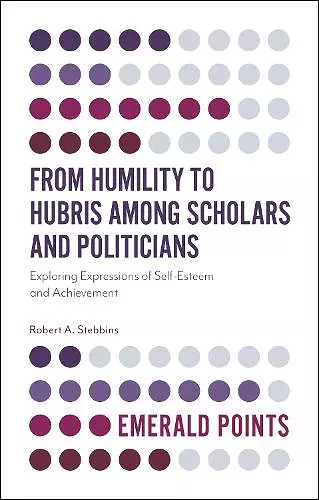From Humility to Hubris among Scholars and Politicians
Exploring Expressions of Self-Esteem and Achievement
Format:Paperback
Publisher:Emerald Publishing Limited
Published:16th May '17
Should be back in stock very soon

Emerald Points
Achievement meritorious enough to generate discussion covers considerable territory. This book concentrates on one part of it: that inhabited by scholars and politicians. In their world self-esteem flowing from achievement is founded on expertise related to ideas, their generation, and their implementation.A main theme running through this book is that we cannot understand the virtues of humility and modesty without an equally good understanding of the vices of hubris and conceit. All four attitudes express self-esteem, which flourishes in the soil of achievement. Achievement is valued in any challenging field, be it art, science, sport, entertainment, business, politics, religion, or administration. And it is for this reason alone that achievers are inclined to discuss their excellence or may be forced to discuss it when others inquire about it or remark on it. By these routes achievement and self-esteem surface frequently in the diverse academic and political exchanges that spawn humility/modesty or hubris/conceit.Achievement in a respectable activity can be a wonderful personal milestone bathed in positive emotions, where in the modern world individualism and individuation are widely valued. It may also be wonderful for other people in the achiever’s family, social network, community, or society when they are favorably affected. But in this book, when refracted through three additional analytic lenses – individualism and individuality, big- vs small-picture thinking, and tolerance and compromise – the expression of achievement-based self-esteem takes on some startling new dimensions. One of them is that, at the hubris/conceit end of the continuum of the expression of self-esteem, discussion risks becoming uncivil, owing to the disagreeable ways that achievement is sometimes conveyed (e.g., boasting, name calling, depreciating others’ related achievements). Moreover, such can turn out to be enormously unproductive. Or as Leo Tolstoy once put it: “Conceit is incompatible with understanding.”
This exploration in symbolic interactionist social psychology investigates four aspects of self-esteem related to scholarly and political achievement: hubris and conceit on the one hand, and humility and modesty on the other hand. The study looks at these four aspects through three perspectives: individualism and individuality, big-picture versus small-picture thinking, and tolerance and compromise—which correspond to micro, meso, and macro levels of sociology and history. The author argues that conceit and hubris have come to dominate conversation in scholarship and politics. -- Annotation ©2017 * (protoview.com) *
ISBN: 9781787147584
Dimensions: unknown
Weight: unknown
192 pages